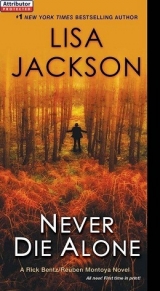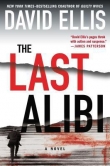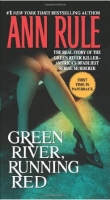
Текст книги "Never Die Alone"
Автор книги: Lisa Jackson
Жанры:
Полицейские детективы
,сообщить о нарушении
Текущая страница: 15 (всего у книги 23 страниц)
He smiled. She had a point.
“Don’t fall for it, Dad. You and I, we both know that your job is dangerous, but it feeds your need for excitement. You’re an adrenaline junkie, and you get a rush out of nailing the bad guys and getting them off the streets. Well, maybe Olivia knows it, too, but she’s fighting it. Because she loves you and she wants you to—Oh, crap, there’s a cop!”
“What?”
“Gotta hang up.”
Then she was gone, the connection severed. He didn’t have to be wearing a detective’s badge to figure out that she’d been lying to him earlier to avoid a lecture. There had been no earbud.
He dropped his phone onto his desk and told himself not to dwell on the decision to leave the department. Not today. He had work to do. He took a swallow of coffee, found it cold, and walked to the kitchen, where a fresh pot was brewing. Several cops were hanging out, reading the paper, eating a hasty breakfast, or lingering over a cup of Joe before heading out.
Turning his head to stretch the tight muscles in his neck, he poured a fresh cup and headed to his office again. He’d just settled in when he heard footsteps approach.
In black jacket and jeans, Montoya filled the doorway. “I’ve got bad news and . . . worse news.” His eyes were guarded by his signature shades, but the set of his jaw and the grim line of his mouth indicated he was perturbed.
“What?” Bentz rolled his chair back.
“The bad news is that there was an apparent homicide last night, maybe early this morning. Working girl, lives off of Chartres, not quite in the Quarter. Mike O’Keefe took the call.” O’Keefe was a street cop who’d been with the department for years.
The hairs on the nape of Bentz’s neck lifted in warning. He knew where this was going.
Montoya added, “Her body was found by the super, who was sweeping up around the outside of the building when he noticed her door was open. Just a crack, but still. According to him, she never left it ajar, always locked up tight. So he peeked inside, saw her lying there, called 9-1-1. The super says he went inside, but he could tell she was dead. Didn’t even try to revive her.”
Bentz’s gut clenched. “Anything else?” he asked, though he could guess what was coming.
“Yeah, the guy who caught the call did a quick sweep of the apartment. The victim was half-dressed, displayed, weird ligature wounds around her neck, and a hundred-dollar bill left at the scene.”
Bentz’s stomach dropped. “Let me guess: Franklin’s eyes on the C-note were blacked out.”
“Bingo.” One of Montoya’s eyebrows appeared over top of his shades. “Father John.” With an affected Louisiana drawl, he added, “He ain’t finished.”
“I was afraid of that. Let’s roll.” Bentz pushed his chair back and reached for his jacket and shoulder holster. “Wait a second,” he said, standing. “There was something else? The worse news?”
Montoya nodded. “Or maybe the not-as-bad news, as we might have caught a break. A security camera at a parking lot near Bourbon Street, where the Denning twins were last seen, got footage of a man struggling with a woman. He subdues her and throws her into a vehicle parked at the edge of the lot. The camera only caught the rear tire and back panel of the vehicle, but it looks like a light-colored van, possibly a truck. I haven’t seen the tape yet, but it’s being sent over. Got a copy going to the lab to see if they can enhance.”
“One woman?” Bentz strapped on his holster and sidearm.
“Yeah, don’t know if it’s one of the Denning sisters. Could be someone else. But the date and proximity are right. The time, too, near the time that the Denning girls’ phones stopped working.”
“How’d you find out about it?”
“After we interviewed the bartender, he told everyone who worked there about it, and the boss decided to review all their security tapes. I’m already checking with other businesses nearby. Maybe they’ve got something.”
“Let’s hope.” He shrugged into his jacket, though he’d probably peel it off again before midday. They headed downstairs to the parking lot. All the while Bentz felt that little buzz that always accompanied a significant break in a case, a little jolt of adrenaline that came with knowing they were on the track of something. So far he wasn’t sure what.
“Let’s check out the apartment off Chartres,” he said. “Then I need to stop by and talk to Selma Denning, check out the twins’ car. By the time we get back, the tape might be back from the lab.”
“If we’re lucky.” Montoya was already stepping through the doors to the street, where hazy sunlight filtered through a canopy of branches and reflected off the concrete. As he reached into the pocket of his jeans, he said, “I’ll drive.”
As if there was any question.
CHAPTER 23
“Rise and shine!” Jase set a cup of coffee on the table near the end of the couch where his father rested, faceup, mouth open, beard shadow more pronounced than it had been less than five hours earlier. Jase had already checked the news feed and had a major lead that he couldn’t ignore, a possible homicide. “Come on, Ed, you know the old saying, the one you always repeated? ‘If you’re going to soar with the eagles, you have to rise with the sparrows.’”
“Go ’way,” his father grumbled, and rolled onto his side to face the back of the couch.
“Dad—”
“Leave me the fuck alone!” Ed burrowed deeper, yanking the cover over his head.
“I have to go to work.”
“Then go already! Who the hell’s stoppin’ ya?”
“Fine. But I’ll be back, and then we need to talk.”
“Yeah, yeah.”
Jase turned away, then paused. “You said that I was the right one to keep.”
“What?”
“That’s what I’m asking. What was that all about?”
“Hell if I know. I was drunk. Or didn’t you notice?”
“I noticed.”
“Fine,” his father said from beneath the blanket, “then you know nothin’ I said made any sense. Now, just leave me alone. For the love of Christ!” He pulled the pillow over his head as if he were a three-year-old child trying to avoid a scolding.
Jase let it go.
For now.
With a final glance at the man who had sired him, Jase grabbed the keys to his truck from a table where his cell phone was charging. He yanked the phone from its cord, pocketed the cell, and then left his apartment. He could let his old man sleep it off, though it wouldn’t be so easy to leave behind the remark about Jase being the chosen one. What the hell was that really about? The drunken ramblings of an old, forgetful man, or something deeper? A slipup? He should just let it go, but knew he wouldn’t.
He thought about the check he’d written to his father but never mailed. He’d intended to post it today, but now . . . oh, hell, everything had already started blowing up.
Making his way down the exterior stairs at the end of the building, he wondered what he would find when he came home. Would his father still be in the apartment? Still sleeping it off? Parked on the couch with no intention of leaving? Or would he be gone? According to Prescott, Ed’s truck was parked at the farm, so he’d have to find a way to retrieve it, unless Prescott brought it into town.
No doubt fireworks would explode when Edward and Prescott came face-to-face again and Pres started going on about Ed and rehab, which Jase agreed was necessary for their father to function and survive. The trouble was, Prescott seemed to think Jase had unlimited funds, first to buy the farm and then to send their old man into some kind of treatment program. The truth was that Jase did have a bit of a nest egg, not that he was getting rich as a reporter. He’d purchased a small two-bedroom, utilized his carpentry skills to renovate, and then sold it when the market was at its peak. After that he’d invested his money in the stock market and hadn’t purchased another house, as he was happy enough in his apartment. Or had been.
So, he could probably get financing and buy out Prescott, and maybe there would be a little left to help out the old man. But then he’d be flat broke, a position he’d become intimate with a couple of times and didn’t much like.
Crossing the parking lot to the assigned spot where his truck was parked, he tried not to dwell on the fact that he soon might own the damned farm, a place he’d sworn to avoid, where his innocence had been buried long ago. “Don’t think about it,” he told himself as he opened the door of the truck. He had a lot on his plate today, starting with the apartment near Chartres where a homicide had taken place.
Then there was the 21 Killer and the series of articles Jase hoped to write about him. With Brianna’s help, he reminded himself. He felt a stab of guilt, wondering if, as she suspected, helping her was actually just satisfying his own personal quest for a story.
Last night’s nightmare flashed through his mind as he settled behind the wheel, a weird dream where one seductive mermaid had really been two women who looked so much alike. Arianna and Brianna. Both had the ability to tug on his emotions. Both inspired gut-wrenching guilt.
“Get over it,” he told himself. He had no time for self-analysis or anything as ridiculous as trying to interpret his own dreams. He started the engine, then noticed a yellow jacket beating itself against the windshield above his dash. “Get out.” He threw the driver’s side door open and tried to scoop the bee to the side with an envelope sitting on the passenger seat, an envelope addressed to his father and containing the check Jase had promised.
At least now it could do some good.
The bee was buzzing and running into the glass, mad as hell as it bounced and hopped along the surface. Maybe just scared. Like so many people. Using the envelope, he scooped the stupid insect out the open door and wondered why he just hadn’t squashed the yellow jacket. It would have been a helluva lot easier. One bee. Who cared?
Again, he had no time for philosophy.
He had a job to do.
Bentz’s stomach turned as he slid covers over his shoes, signed in to the crime scene, and stepped into the tiny apartment off Chartres.
Within seconds a disturbing sense of déjà vu washed over him as he viewed the space with its older furniture and bars on the windows. He noticed paperback books lined up on the built-ins, the coffeepot in the kitchen filled for the next day, the smell of perfume lingering, all surrounding the reason for his being here: the dead body of a thirtysomething female victim.
She was splayed out across the neatly made bed. Half-dressed in a short skirt and open blouse, she lay there with her eyes open as if staring at the gently rotating blades of a ceiling fan positioned overhead.
He clenched his jaw, felt his stomach turn.
Crime-scene techs were busy snapping pictures, dusting for prints, searching every inch of the one-room apartment for trace evidence. None of the others seemed to have the same physical reaction to death that had been with Bentz since he was a kid.
The head tech, Rosarita Gervais, was wearing gloves, her dark hair scraped away from her face. She was leaning over the table where, as Montoya had mentioned, the hundred-dollar bill with Franklin’s blackened eyes had been left. “Don’t be messin’ with my scene, Bentz,” she warned. “You know the drill. Washington will have my ass if you disturb anything.”
She was half-kidding. It was their routine. Broke the tension. But she wasn’t joking about Bonita Washington, the head of the Crime Scene Unit. A brassy African American woman whose IQ was rumored to be at genius level, Washington was tough as nails.
“Got it.” He gave Rosarita a nod but continued to stare at the odd C-note. He had always found the desecrated bills disturbing. Then again, what wasn’t disturbing about a serial killer who dressed as a man of God and killed his victims with a rosary?
“You really got yourself a sick one here,” she observed, then snorted. “Hell, they’re all twisted bastards.”
“Can’t argue with that,” he agreed. He spied O’Keefe, the cop who’d responded to the call, and turned his attention to the burly man rumored to be able to bench press 300 pounds. “Who’ve we got here?”
“Teri Marie Gaines.” A tough cop and a family man, O’Keefe only used his six foot four, 250-pound frame to his advantage if seriously provoked. “At least that’s who she was during the day. It’s the name on her driver’s license. She worked as a waitress at Sylvia Black’s down in the Jax Brewery,” he added, mentioning the huge old brewery that had been transformed into a shopping mall. “But at night,” O’Keefe continued, “she was Tiffany Elite.”
“The super tell you this?” Bentz asked, his stomach roiling as he viewed the victim more closely. With smooth mocha-colored skin, Teri Marie Gaines had dark, tightly curled hair with a few golden streaks. Spread-eagle upon the bed, she was half-dressed in a tiny skirt, a bra that barely held her breasts, and a sheer blouse that was open, draped over one shoulder. Around her neck, dark ligature marks were a combination of bruising and tiny abrasions; little cuts in a distinctive pattern that Bentz suspected came from a rosary made of sharpened beads linked with piano wire or something just as strong.
Father John.
No doubt about it.
His stomach did another roll.
“Yeah,” O’Keefe said, nodding. “The super, he knew what she was doing at night, and it was confirmed by the neighbor in 2-E.” O’Keefe checked his notes. “Frances Kowalski.”
“A customer?”
“No, don’t think so.” He flashed a quick grin. “Mrs. Kowalski is a woman. In her late seventies or early eighties, I’d guess. A widow who apparently makes it her business to know what goes on in every unit in the building, night and day.”
Bentz knew the type.
“She, uh, she disapproved of Ms. Gaines’s nocturnal antics.”
“I bet.”
“Copycat?” Montoya asked.
Bentz thought of the security video from the prison. Father John had stared straight into the camera’s eye, not hiding his face or features, almost flaunting the fact that he was back.
Bentz shook his head. “Doubt it.”
“Yeah, me too.”
Bentz turned toward the medical examiner, a middle-aged man on his knees near the body. “Time of death?”
Wrinkles appeared over his prematurely balding pate as the examiner considered. “After midnight. One thirty to three, I’d say. Rigor’s still strong and body temp suggests that she’s been dead around eight, maybe nine hours. Give or take.” He nodded, as if agreeing with himself. “That would be our window.”
“Defensive wounds?”
“Not really. We’ve got some bruising at her fingers and a couple of scrapes, two broken fingernails, probably from when she tried to pry the garrote from her neck.”
In his mind’s eye Bentz imagined her struggle: a small woman who had expected the john, then was surprised when the tall and strapping man had slipped the rosary around her neck and started pulling, cutting off her air as he twisted his glittery weapon more tightly. Hers would have been a fairly quick, if agonizing and terrifying death. All at the hands of a psycho who should, if Bentz’s aim had been true, already be dead. If Bentz’s bullet had only hit its mark all those years ago in the bayou, at least two dead women would still be alive today. A sense of guilt tried to sneak up at him, but he pushed it firmly away, kept it at bay. For now. “Thanks,” he said to the examiner.
“Hey! She have a kid?” Montoya stood on the opposite side of the bed from the ME, pointing to a silver picture frame positioned beneath a lamp with a beaded shade. A small boy smiled in the picture. Judging from his wide grin, which showed off gaps and permanent teeth just breaking the gum line, Bentz guessed the kid was around seven or eight.
Montoya frowned, his gaze sweeping the room. “No sign that he lived here. No toys or kids’ clothes or video games or books. Kids, they come with a lot of stuff.”
Bentz nodded, then asked O’Keefe, “The super still here? He might know.”
“Or maybe Frances Kowalski,” Montoya suggested.
“Yeah, I’ll talk to her, too.”
“The super’s name is Vincente. Vincente Espinosa.” O’Keefe nodded to the open doorway where a skinny man lurked, peering inside.
“Got it.” Bentz called over his shoulder to Rosarita. “Send me the report.”
“Like you need to tell me,” she muttered, raising a gloved hand to wave him off. She sent him a look that silently suggested she might want to raise her middle finger, but didn’t. “Sheesh, Bentz. How long we worked together? Ten years? Fifteen?”
“Too long, Rosie. Too damned long.”
“Yeah, and I love you, too.”
As Bentz and Montoya stepped outside, Espinosa fluttered into motion. The super grabbed a rag from his back pocket and stepped back, trying to look busy, which was kind of tough when he’d probably been warned not to sweep or touch anything. Somewhere near sixty, his swarthy skin deeply lined, he wore a faded Hawaiian shirt and cargo shorts. His hair was pulled back into a thin, graying ponytail that heightened his receding hairline.
“You the building supervisor? Mr. Espinosa?” Bentz showed his badge, introducing himself and Montoya.
“Yeah, that’s me. Folks call me Vincente.”
“You called 9-1-1?”
He nodded. “I already told the other cop.” Vincente’s eyes were black as obsidian as he squinted against the midday sun.
“So let’s go over it again. We want to hear everything you know about Miss Gaines.”
“It ain’t much.”
Bentz managed a smile. “Let’s start with when she moved in.”
“Three, maybe three and half years ago?” It was a question. “You’d have to ask the owner of the building for sure. Crescent City Developers. They’d have records.”
Bentz was making notes.
“She have a kid?” Montoya asked.
“Yeah, a boy. About nine or ten, I think.” So the picture was a couple years old. “But he was never here. Lives with his dad.”
“Do you know where we could find him?”
“Beats me,” Vincente said. “I didn’t really know her. We never talked much. I just know she had a kid. Lived with his old man, out of town. Don’t know where.”
Someone would have to call the ex and relay the bad news that his son’s mother was dead, the victim of a homicide. The kid had to be found.
“So you knew that she was turning tricks out of her apartment?”
“I didn’t know it. But, yeah, that was the word on the street. And with the hours she kept, the people going in and out . . .” He shrugged. “It seemed likely. But hey, she was a good tenant. Gave me no grief, and she had to do what she had to do, y’know?”
“You see anyone come into her apartment last night?” Bentz asked.
“Me?” Vincente shook his head, the ponytail whipping back and forth. “Nah, I’m in bed before the sun goes down. Watch a little TV, mainly sports. The Saints, they ain’t playin’ now, so I have to settle for baseball. I like the Rays, y’know. Tampa Bay?”
Bentz nodded, and Vincente went on to explain how he slept soundly and even with the window open he’d heard no struggle, no fight. He had only discovered the body, as he’d told O’Keefe and the 9-1-1 operator, when he’d been sweeping up and noticed Teri Gaines’s door cracked open.
The interview revealed few other details, so they moved on, up the stairs to apartment 2-E.
Frances Kowalski wasn’t a whole lot more informative, but the elderly woman in the second-floor apartment filled to the brim with religious artifacts and photos of a man Bentz assumed to be her late husband was certainly an eager witness. Whereas Espinosa had been guarded and a little reticent, Frances Kowalski was effusive to the point Bentz thought the older woman might be exaggerating, just to keep Montoya and him interested.
“About Ms. Gaines,” she’d said from behind owlish glasses, the tops of which brushed thick bangs of dyed red hair. “You know, I have a bird’s-eye view of her apartment. I see everything.” Her lips had pursed in a sanctimonious show of disgust. “And, I hate to judge, you know—”
Bentz thought the opposite was probably true. In his experience anyone who started with “I hate to” usually relished it. Whether it was “I hate to point out,” or “I hate to speak ill of the dead,” or in Frances Kowalski’s case, “I hate to judge,” it all boiled down to some kind of self-justification to spread a little gossip tinged with a bit of self-satisfaction. In some cases, he suspected that these people actually envied the person who broke the rules and walked on the wild side.
“But she had men coming and going all hours of the night.” Mrs. Kowalski’s eyebrows had arched pointedly over the top of the glasses. “They weren’t there selling vacuum cleaners or brushes, if you catch my drift.”
He caught it.
And it stunk.
The more Bentz had talked with the woman, the less he’d liked her. Her only pertinent information was that she had heard “something” and checked her window to witness a man “in black” entering Teri Gaines’s apartment. Her pale lips had pursed even more prudishly as she’d said, “I have no idea what she was doing down there.” A lie. “But it wasn’t good.”
“It ended badly,” Bentz had offered.
“Well, really?” A sniff of self-righteousness. “What could she expect?”
Unable to extract any more information from the woman, the detectives had left her to her snooping and exited the building.
Montoya reached into his shirt pocket for a pack of nonexistent cigarettes, then apparently remembered that he’d quit. Frowning, he said, “I’ll tell you what. I’m glad that old buttinsky isn’t my neighbor.”
“Buttinsky?” Bentz repeated.
“A term my mother used for people who couldn’t keep their noses in their own business. It applies here. With Frances not-a-guy Kowalski.”
“I guess.” Bentz noticed a news van for WKAM setting up shop on the street. “Looks like the press has caught wind of this.”
“A good thing.”
“I suppose.” Bentz wasn’t all that interested in talking to anyone from the media. Deep down, he hated dealing with the “fourth estate,” though it was part of his job. He considered all reporters to be a necessary evil. The relationship between cops and press should be symbiotic, right? Each helping the other? Both groups looking out for the good of the public? But in Bentz’s opinion, too many members of the press were interested in sensational journalism, creating news rather than reporting it, causing a greater public awareness, but also stirring up fear and sometimes panic. Hence, he was careful in dealing with the press and usually tended to avoid everyone who carried a press card.
The TV crew wasn’t alone. Also standing near Montoya’s Mustang was Jase Bridges from the Observer, the reporter angling for a job in the department. It had happened before, when someone from the outside had landed the position, a reporter no less. But Bentz wasn’t certain that Jason Bridges was the man for the job.
“Hey,” Bridges said. “How about a quick interview?”
Bentz shot him a glare. “You know the deal, Bridges. Nothing for me to say.”
“Working girl, the victim?” he asked, undeterred. Obviously the homicide had already hit the wires. From the corner of his eye, Bentz noticed the approach of Brenda Convoy, a reporter from WKAM. A cameraman trailed a step behind her, shoulder cam in place.
“Look, Bridges, you’re not the PIO yet,” Bentz told Bridges, ignoring the TV reporter. “So talk to someone from that office. We’ve got notifications to make and a case to solve. Until I’ve got a good reason to share the investigation with the public, you’re out of luck. At least with me.” And so is she, he silently added, watching Brenda Convoy hurry along, high heels clicking unsteadily over the uneven sidewalk. In one smooth motion Bentz slid into the passenger seat of Montoya’s Mustang and closed the door. A second later, without a word, his partner hit the gas, maneuvering the sporty car so that it melded seamlessly into traffic.
Pain throbbing in her ankle, Zoe pushed herself to keep moving through the woods.
Through the branches, she saw that the sun was climbing higher in the sky. She’d watched it rise, knew which direction was east, not that it helped her much as she had no idea where she was, couldn’t conceive of where she would find civilization. But at least she was convinced she wasn’t walking in circles. She was able to limp with the aid of a stick, and with each torturous step she put as much distance as she could between herself and the prick who had abducted her. Sick bastard. God, she wished she’d killed him. Maybe, by now, Chloe had finished him off.
Zoe’s heart twisted.
Chloe.
Where was she?
Safe?
Or on the run like Zoe?
“Please, God, no,” Zoe whispered through cracked lips. She pressed her fingertips to them and found them encrusted, probably with mud. Maybe even some dried blood mixed in, too. She was still naked but sunburned and bitten by mosquitoes or whatever creepy crawly things had found her bare skin.
Light-headed from the lack of food, water, and sleep, she stopped and listened again, leaned on her stick, and strained to hear. Over the sounds of insects buzzing and a toad croaking, she heard the hum of traffic, wheels spinning over asphalt. Her heart soared.
She would make it.
She’d get to that damned road and flag someone down, someone who would drive her to safety. Tears welled in her eyes and she dashed them quickly away as if anyone here in this godforsaken lowland forest could see her. She’d spent a night listening to bats and owls, looking out for gators and even bears, but finally, she was about to be rewarded. She was going to make it.
But, damn it, she couldn’t tell how far away the road was.
A mile?
Two?
Five?
She wasn’t certain, but she’d get there, pushing through pain, thirst, and hunger. She just had to keep heading in the direction of the sound of engines and tires.
Through the lacy branches overhead she spied an egret sailing in the blue sky, long-necked and snowy white, flying gracefully. She almost smiled as she hobbled forward and brushed the gauze of a spiderweb out of her face.
Maybe she would reach the road in fifteen minutes.
Or it could take an hour.
She wouldn’t let herself think that it would be any longer. Surely she’d find civilization long before nightfall and not have to spend another frightening night alone in the wilderness.
Gritting her teeth, she headed toward the sound.
Somewhere in the far distance she heard a dog barking. Rapid, thunderous barks, as if it had picked up the scent of an animal it was tracking. Poor beast, she thought, relating to the fox or duck or whatever the hound was tracking.
The dog’s cries seemed to get louder and . . . closer. Her heart stopped as a horrifying thought slithered through her brain.
What if the dog was tracking her?
“No,” she said, but the thought took hold.
What if the hound was owned by the psycho who had abducted her?
What if, even now, she, not some woodland creature, was the hunter’s ultimate prey?
Impossible! She’d crossed the river. She’d gotten herself some distance from that horrible cabin with its dank cellar. And all that time she’d spent in the water . . . it had to make it difficult to track her. But still . . .
She swallowed hard. Told herself she was hallucinating. She was safe. Far away from the whack job with his stupid fascination about birthdays.
Right?
But the dog continued to howl, a horrid, plaintive sound that echoed through this shady forest of hickory and pine. Panic skittered down her spine.
How in the world would she, limping as she was, outrun a dog?
It’s not chasing you. Don’t freak out. Just keep moving. Head to the highway. Find a motorist. Get to safety.
And, for God’s sake, Zoe, get there fast!








